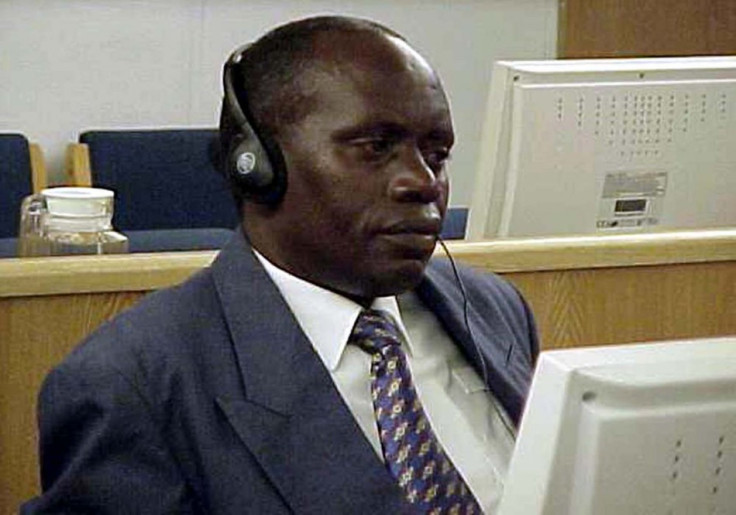Rwanda genocide: Ex-army chief Augustin Bizimungu given 30-year sentence

Over 100 days in 1994, after the assassination of President Juvenal Habyarimana the 6<sup>th April 1994, Rwanda's Hutu majority led by the government carried out the organized slaughter of the country's Tutsi minority and any Hutus who sympathized with them, killing an estimated 800,000 people in the space of three months. In July of the same year, the Rwandan Patriotic Front (RPF) finally managed to gain hold of the country and the killings started to decrease.
The genocide left the world shocked, but the more disastrous effects were without the shadow of a doubt felt by Rwandan civilians, thousands of them who found themselves displaced, after months of witnessing the cruellest atrocities. Following the end of the genocide, the International Criminal Tribunal for Rwanda was set up. It was established for the prosecution of persons responsible for genocide and other serious violations of international humanitarian law committed in the territory of Rwanda between 1 January 1994 and 31 December 1994. It also deals with the prosecution of Rwandan citizens responsible for genocide and other such violations of international law committed in the territory of neighbouring States during the same period.
Who is Augustin Bizimungu and what was his role in the genocide?
Bizimungu was born in 1952 in Byumba in northern Rwanda, a village close to the home of the man that was to become his mentor Felicien Kabuga, the alleged financier of the genocide, who is at present still a free man.
It is said that throughout the genocide Bizimungu prepared lists of ethnic Tutsis to be exterminated, referring to them as "cockroaches" - a term commonly used by those carrying out the slaughter to dehumanise their victims.
He repeatedly went to the homes of militants, distributed weapons and fuel to burn houses and reiterated as often as possible the need for all Tutsi to be exterminated. Bizimungu was known to ignore Tutsis who desperately appealed to him at the height of the slaughter and quite often minutes before they died. He allegedly did nothing to stop the widespread rape, sexual abuse and humiliation of Tutsi women and girls.
However people who knew him at the time describe him as timid and not terribly intelligent while rumour had it that "he wasn't even a good fighter." Bizimungu's career was certainly helped by his fervour to serve president Habyarimana, to whom he was first introduced to by Mr Kabuga. As a young and devoted officer, Bizimungu rapidly became an important personality within the army. "When he received the rank of general, his peers were still lieutenant colonels," said one officer.
In the early days of the genocide, Theoneste Bagosora, the mastermind of the genocide sentenced to life in prison by the International Criminal Tribunal for Rwanda in 2008 and Bizimungu plotted together to overthrow Marcel Gatsinzi, the then Chief of staff. Within a week the he was ousted and replaced by Bizimungu.
Fully understanding the implications of the genocidaire role he played in Rwandan history, Bizimungu was quick to understand that in order for the international community to look the other way, the genocide needed to be construed as an action of "civilian self-defence" or "pacification". Thus, the 1<sup>st of May 1994, he publicly condemned the killings of more than 30 orphans and Red Cross workers in the southern town of Butare.
However, far from decreasing, the killings were still very much taking place at an alarming rate and finally stopped on the 4<sup>th of July when the mainly Tutsi Rwandan Patriotic Front rebel fighters gained more and more ground, finally taking Kigali.
Bizimungu however certainly had nothing to do with the end of the genocide as two weeks after the RPF, he proudly declared, "The RPF will rule over a desert." He was arrested in early August 2002 in Angola, after he had managed to escape capture for eight years. At the time, he topped a list of wanted genocide suspects, for whom the United States government had offered a reward of up to $5m (£3m). His trial, that lasted nine years, saw him being sentenced to 30 years in jail for his role in 1994 killings as he was found to have conspired to exterminate the Tutsi population using the soldiers and militias, which as army chief he controlled, to carry out the killings.
Years after the genocide Bizimungu finally gets the role not that he wanted but rather that is needed as he will spend the next 30 years behind bars while Rwanda and Rwandan move away from the genocide and on with their lives.
Bizimungu not alone: the other convicted perpetrators
The court also convicted Augustin Ndindiliyimana, the former head of the paramilitary police, of genocide crimes but ordered his release as he had already spent 11 years behind bars since his arrest.
Two senior officers tried alongside the generals were also sentenced Tuesday.
Major Francois-Xavier Nzuwonemeye, the former commander of the reconnaissance battalion, was handed 20 years in jail for killing as a crime against humanity and murder as a war crime and his subordinate, while captain Innocent Sagahutu, was also sentenced to 20 years.
Ndindiliyimana was arrested in January 2000 in Belgium and Nzuwonemeye the following month in France. Sagahutu was detained in Denmark and Bizimungu in 2002 in Angola.
Colonel Theoneste Bagosora, portrayed by prosecutors as the brains behind the genocide, was sentenced to life in prison in December 2008, along with two other senior military figures. Bagosora appealed and the hearing ran from March 30 to April 1, but the appeal verdict has yet to be handed down.
.
© Copyright IBTimes 2025. All rights reserved.





















